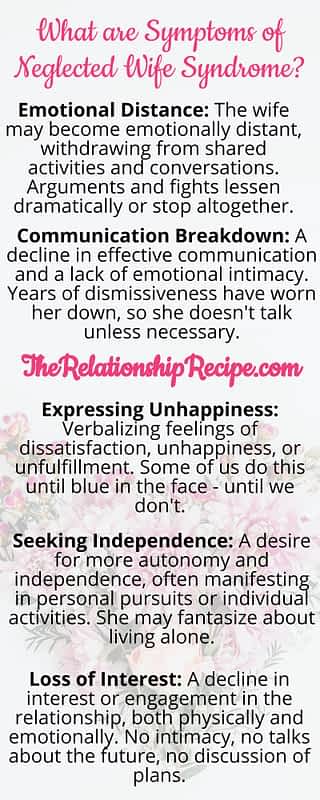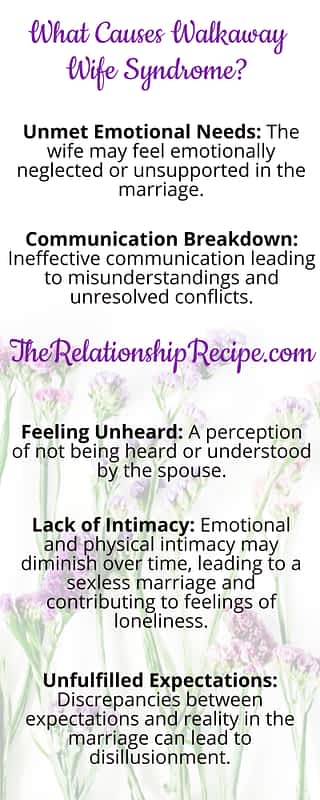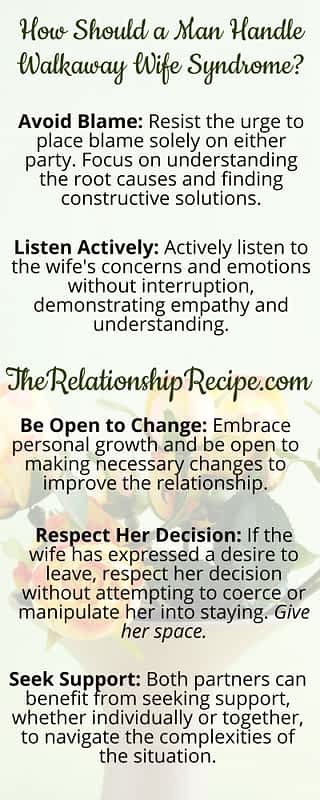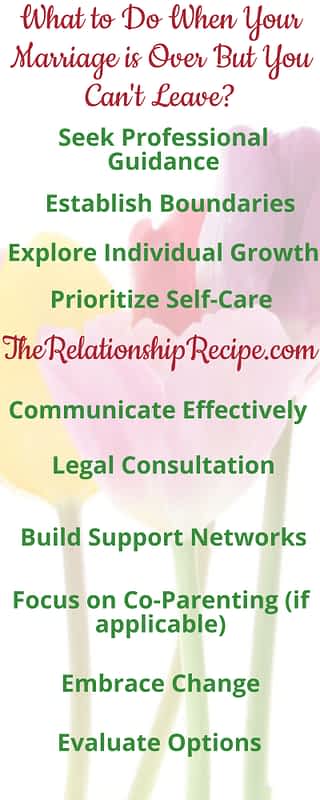Walkaway Wife Syndrome: 5 Signs Your Marriage is Affected
Are you struggling in your marriage and suspect it may have signs of walkaway wife syndrome? Learn about the 5 warning signs, and 10 steps to take if you feel trapped in a marriage that you can’t leave.
We will discuss the core aspects of Walkaway Wife Syndrome (also called “Neglected Wife Syndrome” or “Sudden Divorce Syndrome,”) understand its causes, and possible paths to resolution.

What is Walkaway Wife Syndrome?
Walkaway Wife Syndrome is a term used for the situation where a wife, who has been feeling emotionally disconnected or unsatisfied in her marriage for an extended period of time, reaches a tipping point where she can no longer tolerate the marriage, and decides to walk away.
This decision frequently comes as a shock to the husband, who may not have been in touch with the depth of his wife’s sadness in the relationship – or in many cases, just flat out ignores her unhappiness.
🚀Neglected wife syndrome is characterized by a pattern where the wife, feeling unfulfilled, emotionally distant, or lonely, decides to leave the marriage seemingly suddenly when she has been begging for change for many years only to have it fall on deaf ears.
This may leave the husband blindsided—even if she gave him clear communication and plenty of warning signs—everything but the proverbial frying pan upside his head!
Many women spend YEARS cussing and discussing, crying and cajoling, while secretly hoping and praying he will understand the depth of her unhappiness, and make some changes. They rarely do. With many men, if it doesn’t affect them, they simply don’t care.
I’ve observed this over and over, and 90% of the time, it’s men. Women tend to care more about things outside of their life’s orbit. However, obviously there’s selfishness on both sides.
It’s been my experience that people don’t change for the most part. They may improve in some areas, but the core of who they are as a person doesn’t change much. I’m not saying your husband is a bad person, or even a terrible husband, but he may not be able to love you how you need to be loved.
💔If you are feeling the urge to walk away, he likely hasn’t been listening to you for a very long time either.
If you have felt the desire to walk for a long time, it may be time to go if you have done everything in your power to find happiness while in the relationship.

I am a Prime Example of Walkaway Wife Syndrome
When I first heard the term, I admit, I was intrigued. So much of the meaning behind it resonated with me. I’ve seen some women get offended at the term, because at first glance, it looks like the blame is being placed on the woman, as if she just woke up one day and decided to blow up everyone’s life and get a divorce, which couldn’t be further from the truth.
The fact is, most of us have been begging our husbands, a very long time, to freaking listen to what we are trying to convey to them! They aren’t listening, because they don’t think you will ever leave. In other words, they have no motivation to spur them into action, because he’s happy, and he is unaffected by YOUR unhappiness – plus, the current status quo is somehow working for him.
I have had many, many talks with my husband about our marriage, and how unhappy I am. He doesn’t seem to care, and my comments get met with infuriating dismissiveness.
Or, I get told this is “normal” and “all” marriages are like this, as a way to placate me (or more like get me to shut up).
Well, it finally worked. I don’t have much of anything to say to him now – especially about our relationship. I don’t discuss any future plans, what he wants to do to the house, vacations, etc. We talk about kids and bills. Most other conversations are minimal at best.
Several years ago, I was not ready to leave, but I couldn’t take it anymore and moved to my own room. Having my own “square” has been a lifesaver mentally and emotionally for me, since we are nothing more than roommates anyway. We are on totally different schedules and are like two ships passing in the night. We spend almost zero time together- we don’t even eat at the same time.
At this point, I couldn’t care less. Which is a big reason why we don’t fight much anymore.
I stopped caring.
Another big sign of a failing marriage.

One thing that really nags at me, though, is this:
Can he possibly be happy in a such disconnected relationship like ours?
I think he’s happy as a clam. I realized he is very emotionally unavailable. He hates change and doesn’t like taking risks. He’s been working the same job for decades now.
He also doesn’t have the added frustration of arguing with me since he finally got me to be quiet, and not care anymore. So, he gets all of his perceived bennies of marriage without any of the work, because I stopped caring about the relationship.
Since we don’t argue, everything must be ok! No pressures from me, so whats to be upset about?
He gets to live his life on his terms. He doesn’t have to worry about compromising, and all the other give and take that marriages require.
What intrigues me is, following my decision and the consequential “big talk,” I find myself in a much more peaceful place, even though we both continue to reside in the same home. Things that once triggered my resentment and anger, now barely register.
For instance, the responsibility of taking out the trash, previously designated as “his chore.” I now handle it without making any njoise about it. Whether there are dishes in the sink or dishwasher, despite our agreed-upon ‘rule’ that the cook is exempt from cleanup, I simply take care of it. These were once huge sources of frustration and resentment for me.
A logical question that may arise, or one my STBX is likely contemplating, is: If these tasks no longer bother you, why didn’t you just do them before?
The answer is pretty straightforward, as it’s just a temporary adjustment. I firmly believe in the idea that you teach people how to treat you based on what you are willing to tolerate.
In the past, I resisted or outright refused to perform these tasks, because I knew that doing so would establish a precedent I couldn’t maintain. It’s like giving a two-week notice at a job – knowing it will end soon allows you to temporarily take on responsibilities outside your usual scope.

Can Sudden Divorce Syndrome be Fixed?
The question whether Walkaway Wife Syndrome can be fixed is a complex one. Many times, once a woman is done – she’s DONE. While every relationship is unique, there are strategies that couples can try to address the underlying issues.
When you’re dealing with neglected wife syndrome, you’ve got to be able to open up about what you need, and what’s been missing. That kind of honest conversation can be a big first step in figuring things out. Couples therapy can also help as sometimes having a neutral third party makes it easier to unpack what’s really going on between you two.
That said, not every marriage can be fixed. And sometimes, choosing to walk away is the healthiest move for everyone.

How do Women Feel Who are Thinking of Walking Away?
Women contemplating the decision to walk away from their marriages often experience a range of intense emotions that come in seven distinct stages. These can include feelings of frustration, loneliness, resentment, and a deep sense of unfulfillment.
Leaving a marriage isn’t a snap decision. It’s heavy, and the emotional weight can feel like a ton of bricks. Most women don’t just wake up one day and decide to walk away. It usually comes from a deep need for change, a craving to grow, or just wanting to find happiness again, especially when that happiness feels impossible inside the marriage.

5 Symptoms of Neglected Wife Syndrome
While Neglected Wife Syndrome isn’t an official diagnosis, there are definitely some telltale signs that a woman might be feeling emotionally disconnected in her marriage. Some of those red flags can look like:
- 💔Emotional Distance: The wife may become emotionally distant, withdrawing from shared activities and conversations. Arguments and fights lessen dramatically or stop altogether.
- 💔Communication Breakdown: A decline in effective communication and a lack of emotional intimacy. Years of dismissiveness have worn her down, so she doesn’t talk unless necessary.
- 💔Expressing Unhappiness: Verbalizing feelings of dissatisfaction, unhappiness, or unfulfillment. Some of us do this until blue in the face – until we don’t. Why bother only to be told we are asking too much?
- 💔Seeking Independence: A desire for more autonomy and independence, often manifesting in personal pursuits or individual activities. She may fantasize about living alone.
- 💔Loss of Interest: A decline in interest or engagement in the relationship, both physically and emotionally. No intimacy, no talks about the future, no discussion of plans. She’s likely got one foot out the door.

What Causes Walkaway Wife Syndrome?
Understanding the root causes of Walkaway Wife Syndrome is key for both partners needing answers. Common contributing factors may include:
- 💔Unmet Emotional Needs: The wife may feel emotionally neglected or unsupported in the marriage.
- 💔Communication Breakdown: Ineffective communication leading to misunderstandings and unresolved conflicts. (I’m raising my hand on this one. I feel like I am speaking Greek to him most times.)
- 💔Feeling Unheard: A perception of not being heard or understood by the spouse. Oh my goodness – this one! So relatable!
- 💔Lack of Intimacy: Emotional and physical intimacy may diminish over time, leading to a marriage with no intimacy with no intimacy and contributing to feelings of loneliness.
- 💔Unfulfilled Expectations: Discrepancies between expectations and reality in the marriage can lead to disillusionment.

Can a Man Do Anything to Save the Marriage Experiencing Walkaway Wife Syndrome?
Yes, men can play a proactive role in addressing Walkaway Wife Syndrome and potentially saving the marriage. Here are some steps they can consider:
- ✔️Open Communication: Encourage open and honest communication about feelings, concerns, and expectations.
- ✔️Seek Professional Help: Couples therapy or counseling can provide a structured space to address issues and work towards solutions.
- ✔️Reflect and Adapt: Be willing to reflect on personal behaviors, understand the wife’s perspective, and make necessary adjustments.
- ✔️Express Love and Appreciation: Regularly expressing love, appreciation, and gratitude can foster a positive emotional connection.
- ✔️Commit to Change: Demonstrating a sincere commitment to change and personal growth can contribute to rebuilding trust.

How Should a Man Handle Walkaway Wife Syndrome?
Handling Walkaway Wife Syndrome requires a thoughtful approach. Here are some suggestions for men facing this challenging situation:
- ✔️Avoid Blame: Resist the urge to place blame solely on either party. Focus on understanding the root causes and finding constructive solutions.
- ✔️Listen Actively: Actively listen to the wife’s concerns and emotions without interruption, demonstrating empathy and understanding.
- ✔️Be Open to Change: Embrace personal growth and be open to making necessary changes to improve the relationship.
- ✔️Respect Her Decision: If the wife has expressed a desire to leave, respect her decision without attempting to coerce or manipulate her into staying. Give her space.
- ✔️Seek Support: Both partners can benefit from seeking support, whether individually or together, to navigate the complexities of the situation.

What to Do When Your Marriage is Over But You Can’t Leave?
In cases where a marriage may be over, but leaving is not immediately possible, we may find ourselves in a difficult emotional place. Here are some considerations for getting through this situation:
- ✨Seek Professional Guidance: Consulting with a therapist or counselor can provide valuable insights and coping strategies to navigate the emotional challenges of a marriage that feels over.
- ✨Establish Boundaries: Clearly define and communicate boundaries to ensure that both partners have the space needed for personal reflection and emotional processing.
- ✨Explore Individual Growth: Use the opportunity to focus on personal growth and self-discovery. This may involve pursuing individual interests, hobbies, or engaging in activities that bring fulfillment.
- ✨Prioritize Self-Care: Taking care of your emotional and physical well-being is essential. Prioritize self-care activities that encourage your mental health and overall well-being.
- ✨Communicate Effectively: If the decision to separate or divorce is not immediate, use open and respectful communication to navigate the logistics of the relationship, such as living arrangements and shared responsibilities.
- ✨Legal Consultation: If divorce becomes an inevitable outcome, seeking legal advice early on can help you understand your rights and responsibilities.
- ✨Build Support Networks: Reach out to friends, family, or supportive groups to build a network of emotional support.
- ✨Focus on Co-Parenting (if applicable): If children are involved, prioritize effective co-parenting strategies that consider the well-being of the children while dealing with the changing dynamics of the family.
- ✨Embrace Change: Accept that change is inevitable, and embracing it with resilience can lead to personal growth and the potential for a more fulfilling future.
- ✨Evaluate Options: Consider all available options, including therapy, mediation, or legal counsel, to determine the most appropriate path forward for both of you.

Wrapping Up:
Walkaway Wife Syndrome is messy, emotional, and anything but simple. It usually doesn’t come out of nowhere, it’s the result of years of feeling unheard, unseen, or emotionally drained. And while not every marriage can (or should) be saved, getting to the root of what went wrong and being open to real change can make a difference.
If you’re going through this, take care of yourself first. Talk to someone you trust; a therapist, a counselor, or even a close friend who gets it. Honest, heart-level communication matters, whether you’re trying to repair things or figure out if it’s time to move on.
Your next chapter might be growth within the relationship, or growth outside of it. Either way, make sure every decision you make is grounded in self-respect, and a deep commitment to your own peace.

Thank you for reading this post, don't forget to subscribe!







